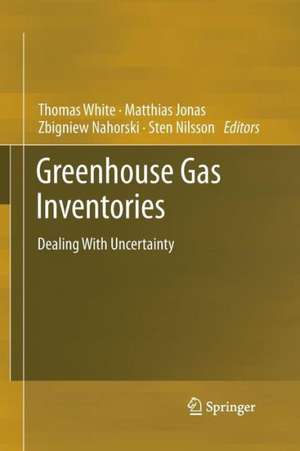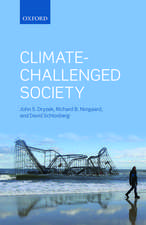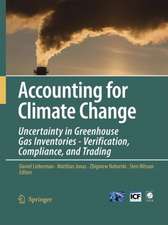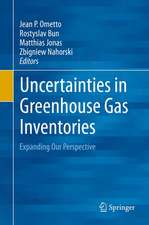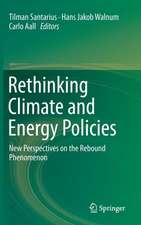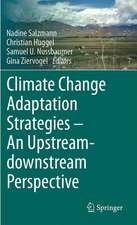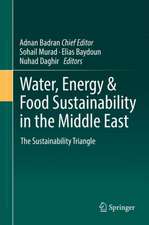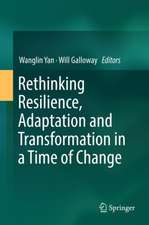Greenhouse Gas Inventories: Dealing With Uncertainty
Editat de Thomas White, Matthias Jonas, Zbigniew Nahorski, Sten Nilssonen Limba Engleză Paperback – 16 oct 2014
| Toate formatele și edițiile | Preț | Express |
|---|---|---|
| Paperback (1) | 946.87 lei 6-8 săpt. | |
| SPRINGER NETHERLANDS – 16 oct 2014 | 946.87 lei 6-8 săpt. | |
| Hardback (1) | 951.29 lei 6-8 săpt. | |
| SPRINGER NETHERLANDS – 13 mai 2011 | 951.29 lei 6-8 săpt. |
Preț: 946.87 lei
Preț vechi: 1154.72 lei
-18% Nou
Puncte Express: 1420
Preț estimativ în valută:
181.19€ • 189.56$ • 150.51£
181.19€ • 189.56$ • 150.51£
Carte tipărită la comandă
Livrare economică 02-16 aprilie
Preluare comenzi: 021 569.72.76
Specificații
ISBN-13: 9789400793187
ISBN-10: 9400793189
Pagini: 348
Ilustrații: V, 343 p.
Dimensiuni: 155 x 235 x 18 mm
Greutate: 0.49 kg
Ediția:2011
Editura: SPRINGER NETHERLANDS
Colecția Springer
Locul publicării:Dordrecht, Netherlands
ISBN-10: 9400793189
Pagini: 348
Ilustrații: V, 343 p.
Dimensiuni: 155 x 235 x 18 mm
Greutate: 0.49 kg
Ediția:2011
Editura: SPRINGER NETHERLANDS
Colecția Springer
Locul publicării:Dordrecht, Netherlands
Public țintă
ResearchCuprins
Benefits of dealing with uncertainty in greenhouse gas inventories: introduction.- Statistical dependence in input data of national greenhouse gas inventories: effects on the overall inventory uncertainty.- Uncertainty analysis for estimation of landfill emissions and data sensitivity for the input variation.- Toward Bayesian uncertainty quantification for forestry models used in the United Kingdom Greenhouse Gas Inventory for land use, land use change, and forestry.- Atmospheric inversions for estimating CO2 fluxes: methods and perspectives.- European CO2 fluxes from atmospheric inversions using regional and global transport models.- Remotely sensed soil moisture integration in an ecosystem carbon flux model. The spatial implication.- Can the uncertainty of full carbon accounting of forest ecosystems be made acceptable to policymakers?.- Terrestrial full carbon account for Russia: revised uncertainty estimates and their role in a bottom-up/top-down accounting exercise.- Comparison ofpreparatory signal analysis techniques for consideration in the (post-)Kyoto policy process.- Verification of compliance with GHG emission targets: annex B countries.- Spatial GHG inventory at the regional level: accounting for uncertainty.- Quantitative quality assessment of the greenhouse gas inventory for agriculture in Europe.- A statistical model for spatial inventory data: a case study of N2O emissions in municipalities of southern Norway.- Carbon emission trading and carbon taxes under uncertainties.- CO2 emission trading model with trading prices.- Compliance and emission trading rules for asymmetric emission uncertainty estimates.- The impact of uncertain emission trading markets on interactive resource planning processes and international emission trading experiments.
Notă biografică
The Editors Iain Stewart and Matthias Jonas work for the International Institute for Applied Systems Analysis (IIASA), an international scientific institute that conducts research into the critical issues of global environmental, economic, technological, and social change that we face in the twenty-first century. Their findings provide valuable options to policy makers to shape the future of our changing world. IIASA is independent and funded by scientific institutions in Africa, the Americas, Asia and Europe.
Textul de pe ultima copertă
The assessment of greenhouse gases emitted to and removed from the atmosphere is high on the international political and scientific agendas. Growing international concern and cooperation regarding the climate change problem have increased the need for policy-oriented solutions to the issue of uncertainty in, and related to, inventories of greenhouse gas (GHG) emissions. The approaches to addressing uncertainty discussed here reflect attempts to improve national inventories, not only for their own sake but also from a wider, systems analytical perspective — a perspective that seeks to strengthen the usefulness of national inventories under a compliance and/or global monitoring and reporting framework. These approaches demonstrate the benefits of including inventory uncertainty in policy analyses. The authors of the contributed papers show that considering uncertainty helps avoid situations that can, for example, create a false sense of certainty or lead to invalid views of subsystems. This may eventually prevent related errors from showing up in analyses. However, considering uncertainty does not come for free. Proper treatment of uncertainty is costly and demanding because it forces us to make the step from “simple to complex” and only then to discuss potential simplifications. Finally, comprehensive treatment of uncertainty does not offer policymakers quick and easy solutions.
Caracteristici
This is a reference book for dimensioning building and managing eddy covariance systems. This is a reference book for setting up rational data treatment procedures. This is a handy reference book for students that want to study the bases of eddy covariance, while at the same time rational and accessible to non-specialists in micrometeorology. This is a reference book for all the research groups in the world starting or want to use the eddy covariance technique to monitor C budget of terrestrial ecosystems.
